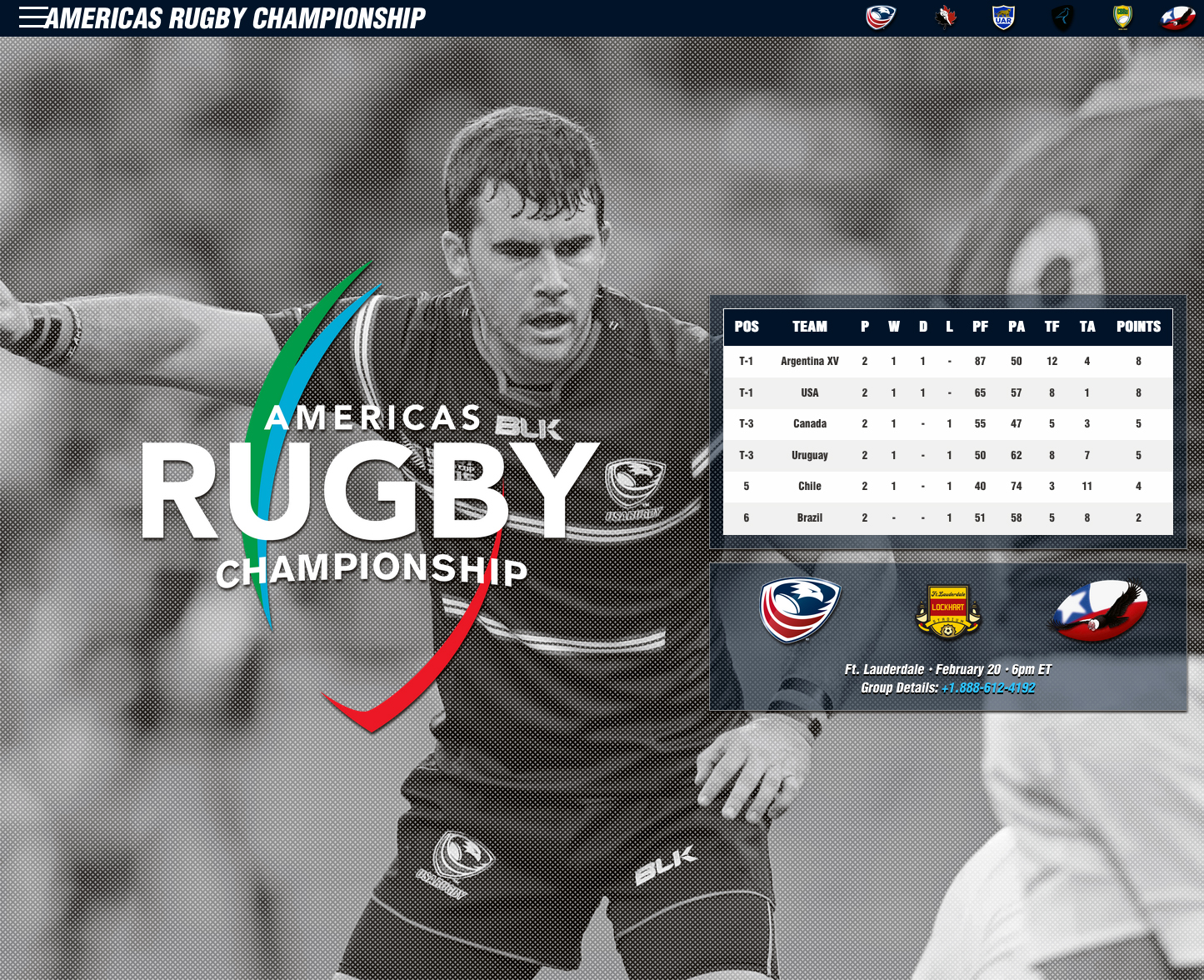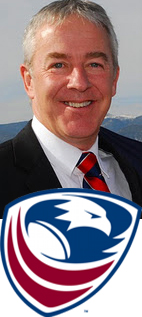
 PHILADELPHIA, PA – The Americas Rugby Championship is just over 2 weeks old and seems off to a healthy start. There is a broadcast deal in place, the crowds have been respectable, and the rugby itself has been fun to watch. Knowing that there have been many tournaments that have been born and died in North America in the last 20 years, it is prudent to clearly understand the goals of the new ARC, both short-term and long-term, and to assess the chances of survival. While in Houston for the first round of the #ARC, I spoke separately with USA Rugby CEO Nigel Melville and Argentine Rugby Union board member Martiniano Guevara to get their perspectives on the Short-Term and Long-Term Americas Rugby Championship Goals.
PHILADELPHIA, PA – The Americas Rugby Championship is just over 2 weeks old and seems off to a healthy start. There is a broadcast deal in place, the crowds have been respectable, and the rugby itself has been fun to watch. Knowing that there have been many tournaments that have been born and died in North America in the last 20 years, it is prudent to clearly understand the goals of the new ARC, both short-term and long-term, and to assess the chances of survival. While in Houston for the first round of the #ARC, I spoke separately with USA Rugby CEO Nigel Melville and Argentine Rugby Union board member Martiniano Guevara to get their perspectives on the Short-Term and Long-Term Americas Rugby Championship Goals.
ARC Goals
When I spoke with Melville, I asked him about the purpose of the ARC: “I was sitting in the office and getting frustrated  with not knowing who we’re playing in June, not knowing who we’re playing in November. World Rugby couldn’t tell me. It’s ridiculous; we’ve got 6 games a year. It can’t just stay as it is. We’ve got to do something different. So I looked at regulation 9. We had some release weekends, I looked at when we could probably play in the window, in the season, and then I went to the rankings and picked out the top 6 teams in the Americas and emailed their CEOs and within 20 minutes they’d all come back and said, ‘We’re in. We all need games.’ So that was really the start of it. We met in Miami and got World Rugby on board and gone from there really. That was a year ago.” Guevara also mentioned the role of Augustin Pichot. “Of course the support of Augustin Pichot was very important. This tournament is very important for him, too.”
with not knowing who we’re playing in June, not knowing who we’re playing in November. World Rugby couldn’t tell me. It’s ridiculous; we’ve got 6 games a year. It can’t just stay as it is. We’ve got to do something different. So I looked at regulation 9. We had some release weekends, I looked at when we could probably play in the window, in the season, and then I went to the rankings and picked out the top 6 teams in the Americas and emailed their CEOs and within 20 minutes they’d all come back and said, ‘We’re in. We all need games.’ So that was really the start of it. We met in Miami and got World Rugby on board and gone from there really. That was a year ago.” Guevara also mentioned the role of Augustin Pichot. “Of course the support of Augustin Pichot was very important. This tournament is very important for him, too.”
The general goal of the ARC is regular competition that provides all union more matches and, therefore, more of a chance to develop players.
Both USA Rugby and the UAR want more matches for player development, though Melville and Guevara spoke about this quite differently, highlighting the different positions of the two unions. For Argentina, “Right now we have too many players in the system.” Those players that Argentina has “in the system” need good competition, and the ARC can provide that. The recent call up of Joaquin Paz to the Jaguars illustrates how the ARC benefits Argentina – a young player was getting good matches within the Argentine system and the transition to the Jaguars will be easier than if he’d been playing domestically.
For USA, Melville sees the ARC as “More chance for our domestic players to play at a higher level of games. It means that we won’t always get our players back from Europe because of contracts and you have to respect that. They have a living to earn.”
 Because the tournament is set for the next 5 years, that general purpose is met simply by the matches being played. A certain level of success aleady exists. For Guevara, the tournament is a success simply because it has become reality. “Politically speaking this is already a success for us because we could organize it without too many months ahead.”
Because the tournament is set for the next 5 years, that general purpose is met simply by the matches being played. A certain level of success aleady exists. For Guevara, the tournament is a success simply because it has become reality. “Politically speaking this is already a success for us because we could organize it without too many months ahead.”
If the criteria for success are met at the start of the tournament, there seems little to be pushing towards, working towards during the tournament itself. Having spoken to Coach John Mitchell and several players, they clearly have goals to work towards, but the unions themselves also need to be moving forward.
Speaking about success from a USA perspective in Year 1, Melville said, “Success is actually getting a new squad together and a new coach having a look at them. Essentially, [it] gives him 5 weeks on the road with a bunch of young players who have great talent. Is it all about winning and losing? No, but winning and losing helps. Everyone wants to win.” The assumption for the Eagles is that more time together for the domestic players will necessarily improve play. In order for that improvement to happen, the right players need to be selected and they need to be in the right kind of environment; simply being together is not enough. That positive scenario may very well be happening right now, but the simple existence of the tournament will not magically improve standards. Argentina is confident in its player development structure, and they have good reason to be. It seems early for USA to have that same confidence.
Another goal for Argentina is to help other unions improve. As Guevara put it, “It’s a great opportunity for us, for our union to support the rugby of the continent. Why not dream of lending a hand to one of these countries and go with them to Tier 1.”
Tournament Timing and Player Availability
I expressed earlier that, for the long-term, the timing of the tournament within the global calendar seems poor. When asked about the timing, Guevara commented that, “The calendar, it is very tight. It’s a very demanding calendar. I guess it [timing] is okay. We’ll see if there is a better part of the year. It’s okay. We were not really focused in the details of this starting edition. We just want it to become real.”
Melville’s response was more complicated. “This particular tournament is also a good opportunity for us to ask World Rugby to revisit Regulation 9 for the benefit of our players and for our unions because we need to be able to access our players on a regular basis. Regulation 9 doesn’t work for us. So this is an opportunity to say, ‘This is why it doesn’t work.’” Melville thinks that one way to improve player release language would be to do away with specific calendar windows: “Regulation 9 should be, we agree how many test matches we all play a year. So if it’s 10, if everyone in the world gets 10, then we can release the players 10 times and we [the unions] decide when they are.” This will not be a simple revision to get through.
Regulation 9 outlines when national unions have the right to get players released from their clubs. The current Northern Hemisphere period is from the first weekend in February through the third weekend in March. I emailed Bob Latham, who is a member of World Rugby’s Regulations Committee and USA Rugby Chairman, asking him to comment on the likelihood of Regulation 9 being revised. He confirmed that there is a new conversation about release windows, but also noted that the Regulation itself does not need to be revised to allow American and Canadian players to be released.
This is a fair point; for the ARC, it is the status quo and precedent that seem nearly as powerful as the regulation itself.
Currently, the nations involved in the ARC don’t have their best players involved. It is tough to sell a tournament to fans and sponsors when the on-filed product is clearly not the best that each country can do. For Canada and USA, under the current language of Regulation 9, they can get all of the players they want from their professional clubs. However, expecting or demanding such access to players will put the players and the clubs in a situation that is awkward at best and might become hostile. For the countries in South America, they have a different release window because they are in the southern hemisphere. They have no official standing to support them if they request players be released from professional clubs in February. Of course, the fact that the matches against the Argentina XV are not full tests means that clubs would be justified in not releasing North American players for a match that is not a full international. Argentina could access most of its top players – who are now playing with the Jaguars in Super Rugby – but 1) do not need to in order to be highly competitive in the ARC and 2) are unlikely to prioritize the ARC over their participation in SANZAAR competitions.
Money
The ARC will go the way of The Churchill Cup and the Pacific Rim Championship unless, at some point, it becomes a venture that makes some money. Having ESPN involved for the first 5 years of the tournament certainly helps in terms of the ARC looking like a sellable product. Melville and Guevara both said, unsurprisingly, that the tournament will not make money this year. But when I asked Melville if it will be making money in Year 5, he responded, “Oh, yeah. I mean, there will be a title sponsor for it. And that will start next year.” I asked if we know who that sponsor will be. “Yes, I do. They are coming in next year. You’ll have heard of the company.”
In addition to the title sponsor, Melville pointed out, “Then you have your own rights locally, it means you can upsell your own rights locally…for the individual matches.” The matches that each union hosts will change each year, and the amount of revenue available from local rights and tickets sales will vary quite a bit accordingly.
Guevara expressed hope, but did not seem concerned about the tournament becoming a successful commercial venture. “Of course it would be great if within the years we can make money because with that money the unions can invest in more development. You need the money to provide the support the system demands, but with this tournament we are not expecting [to make] money.”
Sponsors want to be involved with a product that is good and will last.
Long-Term Outlook
The ARC looks all but assured to achieve many short-term goals. It is not yet clear, though, if this tournament is really being set up to make the Americas a fully competitive rugby region. That will take more than 5 years, and right now, no one seems to be planning that far ahead.
It is clear that asking players and coaches the “20 year question” is foolish. When I asked Blaine Scully about what he thinks the next USA Rugby CEO’s to-do list should be, he answered with a laugh: “I couldn’t even begin to answer that question. I take high balls and make tackles for a living.”
One of the things I wonder about is what happens to the tournament when it succeeds (Why not imagine success for a moment?) and several of the unions involved easily defeat an Argentine developmental side. Neither Guevara nor Melville seemed too concerned about that. Guevara expressed confidence in Argentina’s ability to develop the players necessary to compete simultaneously in Super Rugby and the ARC. What happens when the Argentine developmental side is consistently beaten in the ARC? “We’d like to have that problem. That would mean that we succeeded in what we’ve started right now. In parallel, we’ll be increasing the number of players involved in our system, so we are confident that we can have enough players with the accurate level to take part of this competition. That is another goal for us.”
It seems unlikely that the Americas could lure Argentina away from SANZAAR, but perhaps. And if there are more Super Rugby sides in the Americas, many current considerations would change.
Someone needs to be providing the long-term vision. If we don’t know where we want to be in 20 years, how are we going to get there?
Geuvara, “With our last few years experience with our introduction to SANZAAR and I guess we’ve learned a lot we settle some goals difficult to achieve but not impossible and we were really conscious that we must go step by step. Right now we are focused with this tournament that we have to consolidate it, we have to make it grow year by year within the next 5 years, and then we’ll see what will be our next goal. Saying we, I am talking about the 6 unions that are taking part.”
Despite my desire to know the long-term plan, there is real wisdom in Geuvara’s approach. There is a lot that might change in 5 years. If this tournament succeeds, it could be part of the mounting pressure toward a new global calendar and new organization of club and international tournaments. I suppose I must try to be patient and trust in the general positive momentum of rugby in the Americas.
The post was originally posted before Bob Latham could reply to my email. It was updated to include his reply.
Feel free to comment below, look for and “Like” our Facebook Rugby Wrap Up Page and follow us on Twitter@: RugbyWrapUp, Junoir Blaber,James Harrington, Jamie Wall, Nick Hall, DJ Eberle, Jake Frechette, Scheenagh Harrington, Jamie Loyd, Cody Kuxmann, Karen Ritter, Ronan Nelson, Kaitlin McCabe, Kyle Phillips, Rocky Brown and Declan Yeats, respectively.
[os-widget path=”/rugbywrapup/weekly-rugby-quiz”]

